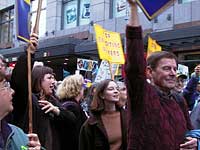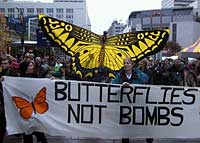SEATTLE, Wash.
The metaphor is irresistible. Between 8 and 10 this morning in downtown Seattle, the protesters owned the streets. Later in the day, they vied with police, back and forth; but as the day began the cops were back inside their perimeters, and the few thousand drumming, singing demonstrators were firmly in control. And so, as delegates began to arrive for the opening session of the WTO summit, they found the usual order of things completely reversed.

Hey hey, ho ho, WTO has got to go.
Photo: Lisa Hymas.
These people — elites from almost every nation on the planet — couldn’t get through the cordon of linked-arm demonstrators blocking every intersection and entrance. When they tried, they were politely refused: “The WTO is closed today.” A platinum card didn’t help, nor an official title, nor the self-assured manner of those born to power. People beating on drums, people dressed like butterflies, simply turned them away.
The delegates huddled in small knots along the street, easy to pick out by their clothes: They were the ones in suits, ties, dresses, not the ones in ponchos, war paint, bandanas. They couldn’t get where they were going, they couldn’t do their work, and they couldn’t quite believe it. A few of them panicked. “Protect us at once,” a man demanded of a police officer at the edge of the crowd, and indeed he was hustled away in a police car. But most of them just stood, bewildered or bemused, and eventually drifted away.
They’ll be back tomorrow, of course, and they’ll eventually have their meeting. However, and it’s a big however, the era when global trade decisions get made without anyone noticing is officially over. That’s the metaphor this day provides: In just the same way that activists managed to shut down the work of this summit, so too activists around the globe are learning to use the Internet and many other tools to slow down and confuse the rush to globalization.
Late last week, American agricultural organizations warned U.S. farmers not to plant genetically modified crops next spring, for fear they’d have no markets; they have no markets because the very same people who were marching through Seattle today have managed to convince most Europeans to demand actual food. It’s a different world. At least a little different, anyway.
At 10 a.m., the regular order tried to reassert its authority. The police had grown tired of people blocking the intersection of Union and 6th. And so they converged from two sides. From behind, looking Vaderish in black ponchos and gas masks, they shot tear gas and rubber bullets. From in front, looking storm trooperish in riot visors and full body armors, they wielded batons. People retreated before the charge — one of the few uses of serious force against unarmed, peaceful civil disobedients in recent American history.
A small tank rolled in to claim the corner. But the police were left with an intersection and not much more. Delegates couldn’t make it through the clouds of pepper spray which lingered in the air, burning eyes and filling lungs. And before long the protestors were back, this time with arms chained through PVC pipe. And that was just one intersection; there were half a dozen other corners where the same kind of battle was underway.
A few bands of balaclava-clad anarchists did circulate up and down the street, causing mild mayhem: broken windows here and there. But most of the crowd was peaceful, brave, and remarkably upbeat even after the police charges. There was little anger, and little fear — and a wave of good feeling when word began to spread that indeed the few delegates who had gotten through to the convention center were packing up and going home for the day.

Spreading their message.
Photo: Lisa Hymas.
Posters and t-shirts celebrated a hundred related causes: The redwood groves of northern California, the people of Tibet, the sea turtles whose slaughter the WTO had officially condoned, the Zapatista rebels of Chiapas, the Industrial Workers of the World. “Eat Local Organic Food,” “Stop Nigerian Genocide,” “Visualize a World Full of Soul-Sucking Parasites,” and best of all, “Wake Up, Muggles!”
Easy enough to dismiss them as a disparate group of unlikely campaigns, but easier still to see how they fit together — to sense a celebration of the local, the particular, the magic, the democratic, here in the shadow of a giant Niketown, a glass headquarters for sweatshop wages and homogenized taste. As corporations and bureaucracies get bigger, they simultaneously get more powerful and more vulnerable. That’s the gut feeling I’ll take home from the pepper-sprayed streets of Seattle. Here’s a way to understand what I mean: Ask yourself what city is going to volunteer to host the next meeting of the WTO.
I talked to a delegate from Jamaica early this morning, in the hours when the police had vanished, leaving them alone to face the demonstrators. He was on the steps of the Sheraton, where a line of singing young people had blocked his access. What do you make of it all, I asked him. He thought for a minute, thought hard, groped for a word, then for another. “I find it very interesting,” he finally said. Exactly right, I thought. The world is a more interesting place than it was yesterday.

